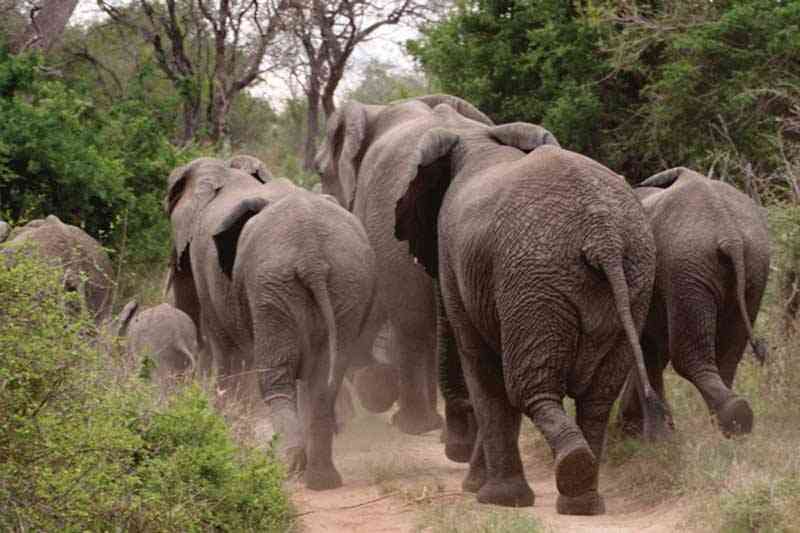
LEGISLATORS are calling on the government to quit Convention on International Trade in Endangered Species of Wild Fauna and Flora (CITES) in order for the trading and eating of wildlife animals to go on unencumbered, owing it to increased human-wildlife conflict.
According to statistics from Zimbabwe Parks and Wildlife Management Authority, this comes as the country’s elephant population stands at over 100 000, against a capacity of 45 000.
During a recent Senate session, Senator Morgen Komichi of Harare East asked the Environment, Climate Change, Tourism and Hospitality Industry minister, Nqobizitha Mangaliso Ndhlovu, why the government couldn’t abandon CITES.
CITES was enforced on July 1, 1975 to protect endangered wildlife animals globally.
Komichi said :“My question is directed to the Minister of Environment, Climate Change, Tourism and Hospitality Industry; in Zimbabwe, human-wildlife conflict is escalating mainly due to overpopulation of animals in the respective areas,”
Further adding: “It has been the desire and wish of Zimbabweans to beneficiate from these animals in ivory trade and meat consumption so as to control the herds. We are aware that there is an organisation called CITES which does not allow us to do so. Why do we not quit CITES so that we can manage our animals without anyone managing us from afar?”
Zimbabwe’s Parliament is split into two bodies, the Senate and the National Assembly, with the former being the upper house and latter being the lower. Senate consists of 80 members while the National Assembly consists of 270.
The reason why legislators are seeking to abandon CITES is based on the commercial value of wild animals and their resources as well as it being a potential meat source.
- Zimbabwe’s lobby to lift ivory trade ban stutters
- Zimbabwe ivory trade lobby raises questions
- Japan, EU in lukewarm response to Zimbabwe’s lobby to lift ivory ban trade
- Involve communities in conservation, says Ndlovu
Keep Reading
For example, concerning the nation’s 130-tonne ivory stockpile, the government of Zimbabwe estimates the value at US$600 million.
But, based on prices of ivory in a report from the Dutch organisation, the Wildlife Justice Commission, Zimbabwe’s ivory stockpile could be worth in the region of US$10,4 million.
This is based on an average price of US$80 per kg for wholesale raw ivory sold in two unnamed southern African countries referenced by the organisation in a 2020 report titled ‘Rapid Assessment of the Illegal Ivory Trade’.
“Could the minister apprise the nation of the benefits which we are getting from CITES — that will be very useful because I think it is now common cause that CITES does not serve our national interests,” senator for Masvingo Tichinani Mavetera queried.
He said the world over is putting their nation first, you can go to the United States and it is the United States first.
“Why should Zimbabwe be affected by policies that benefit other countries because we are not poachers? We have managed our resources and we should benefit from it.
The honourable minister (Ndhlovu) said we want to save for the world. I think we should save Zimbabwe first,” Mavetera said.
In response to the two senators, and others, Ndhlovu agreed that the country stood to benefit a lot from the wildlife in dealing with what he reported as rising human/wildlife conflict.
“It was for the first time three years ago that within the CITES convention, a country deposited a dispute and that was Zimbabwe. It was on the basis that we felt that the issues of Zimbabwe were not being given the attention they deserve and this also applied to the whole southern African region which holds more than 85% of the world elephant population,” Ndhlovu said.
“We have an option to walk out of CITES, but it is a position which we have to clearly consider with its merits and demerits whether it will solve the problems we have or not. The potential buyers of our products are members of CITES. They will not be in a position to purchase any if they are still within CITES. If moving out of CITES is a solution to our problems, we would have left CITES."
In light of this, he said efforts needed to become regional in influencing CITES to make considerations in allowing countries dealing with rising human/wildlife conflict to benefit from the resources from these animals.
“Aside that, the government is working on a policy which we are almost concluding and awaiting Cabinet approval. We believe that it is important as a government to consider options to compensate communities that are bearing the brunt of human-wildlife conflict,” Ndhlovu said.
“We are, at the moment, perhaps the only country in the region that still has not brought that as a policy and that policy, as I said, is awaiting Cabinet approval. We believe it will go a long way because it also utilises proceeds from wildlife, particularly from hunting so that we are able to respond to the increasing human/wildlife conflict."
At the 19th meeting of the Conference of Parties in Panama City, Panama, slated to take place next month from November 14 to 25, the government is preparing to be more aggressive in pushing for certain CITES considerations.
“We will take a very strong position to advocate for CITES to consider strongly our position because the situation keeps getting worse from CITES to CITES and we know that as government, because of funding from certain so-called animal rights groups fail to consider reason and science,” Ndhlovu said.
“We are in the process of engaging them so that when we go there, we will speak with one voice.”
He, however, admitted that although the country had benefited from CITES, as CITES had also benefited from Zimbabwe, mostly through sharing best practices in conservation of different natural resources and best practices in terms of international trade.
Follow us on Twitter @NewsDayZimbabwe










